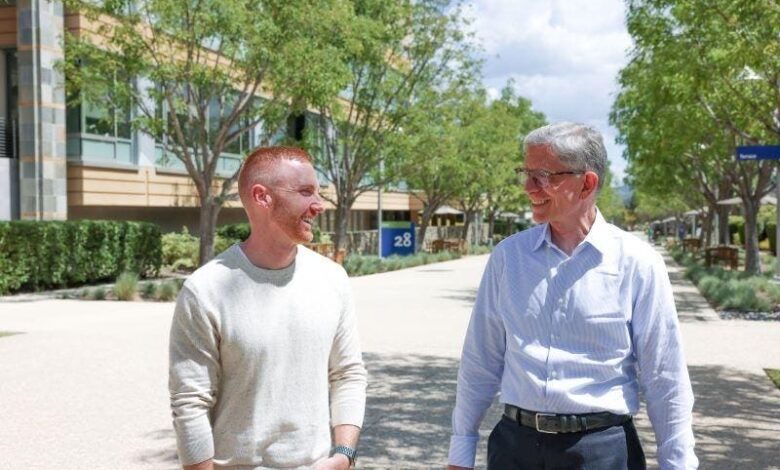Amgen’s First CTO Has Big Plans For AI–And An AI Head From Nike to Help Fulfill Them

When Dr. David Reese, Amgen’s first chief technology officer, set about hiring a head of artificial intelligence last year, he looked at people who’d worked in consumer products, finance, and other areas. He ended up finding one in shoes. Last August, he brought on Sean Bruich, who’d spent the past 11 years of his career working at Nike, as senior vice president for AI and data, a move that might seem almost laughably incongruous.
“When I was in discussions with him, we were having dinner one evening, and he said, ‘I’m not a molecular biologist or a chemist or anything like that,’” Reese told Forbes. “I said, ‘We’ve got those, they are really good, among the best in the world, and we need what you can bring to the table.”
Like both its peer Big Pharma companies and smaller biotech startups, Thousand Oaks, California-based Amgen is counting on AI to both speed up the process of drug discovery and make its operations more efficient. But most of the best data scientists aren’t working in healthcare–at least not yet. So Bruich’s career path took him from Google to Facebook to Nike before he landed at Amgen, the $151 billion developer of blockbuster drugs like Enbrel for autoimmune diseases and Repatha for lowering ‘bad’ cholesterol.
In his role at Amgen, Bruich is responsible for accelerating its AI and data science across everything from protein folding, which is a key element of drug design, to regulatory filings. “My job is to figure out how to scale these things from proof points to systems that operate at enterprise levels,” Bruich said. While biology may be new to him, the underlying data science is not.
Life sciences are generally further behind in adopting AI than tech companies or financial services firms, which have long been incorporating AI into their operations. So Amgen isn’t alone in hiring from outside of the industry, said Joni Noel, co-head of global healthcare and life sciences at executive search firm ZRG Partners. “All I see is hires that come from elsewhere,” she said.
Reese sees enormous promise for the use of AI and data science in healthcare–despite the equally enormous complexity. “There are many skeptics out there. They are going to be wrong,” he said.
An oncologist by training who was previously Amgen’s executive vice president of research and development, Reese believes that recent advances in AI technology have created “a once-in-a-generation moment that will ultimately change this industry.”
Reese has said that he wants to use AI to increase the success rates in drug discovery and to shorten the time it takes for a drug to progress from the lab to commercial approval. It currently takes at least 10 years and costs an average of $2.6 billion to bring a drug from initial discovery to approval, according to the trade group PhRMA. AI has the potential to cut years off that timetable. Reese also sees potential for AI in what he calls “the unsung hero of all this”—automating its plants.
Last year, Amgen installed an Nvidia supercomputer at its deCode genetics subsidiary in Reykjavik, Iceland, where it is using that compute power to mine massive amounts of genetic information in hopes of finding new treatments. This could be particularly helpful for diseases that are complicated on a molecular level, such as autoimmune diseases like lupus, Reese said. “It’s one of my core beliefs that it is only through AI and its computational power that you have any hope of sorting that out.”
Bruich may be new to healthcare, but not to the complexity of data or the partnerships that big companies form to speed up AI’s adoption. He started his career at Google back in 2006, when data science as a field was in its early days, then worked on Facebook’s ad sales. Then, at Nike, he was in charge of the efforts to digitally power the company’s internal operations through data-driven measurement and forecasting.
“Between working on the Facebook algorithms and going to Nike and building out their direct-to-consumer stack and customer experiences that are personalized algorithms, that’s the expertise that I’m going to apply first,” he said. “At Nike, we were teaching marketers to do digital marketing and teaching business leaders to use data.”
While there’s a big difference between selling running shoes and hoodies and developing drugs, Bruich figures that while the biology is new to him, the technology that underpins the work cuts across industries. “Not only is this the moment to be in biotech and I am a science dork so I get it, but he [Reese] has built something really different by bringing together the science and the technology in a different way,” he said. If you are a fan of outdoor activities and adventure, then you probably have a strong connection to nature. There is something truly special about being surrounded by the beauty of the natural world, whether it be the towering trees of a forest, the vast expanse of a desert, or the rugged peaks of a mountain range. For many, spending time in nature is not just a hobby, but a way of life.
One of the most popular activities for outdoor enthusiasts is hiking. Hiking allows you to explore the great outdoors, get some exercise, and connect with nature in a way that is truly unique. Whether you are hiking through a lush forest, along a rugged coastline, or up a challenging mountain trail, there is something magical about the experience of being out in nature, surrounded by nothing but the sights and sounds of the wilderness.
For many hikers, the appeal of the activity lies in the sense of freedom and independence that it provides. When you are out on the trail, you are free from the distractions and stresses of everyday life. Instead, you are able to focus on the present moment, on putting one foot in front of the other, and on taking in the beauty of your surroundings. There is a sense of peace and tranquility that comes with being out in nature, away from the noise and chaos of the modern world.
But hiking is not just about the physical and mental benefits that it provides – it is also a way to connect with the natural world and to appreciate the beauty and diversity of the environment. When you are out on the trail, you have the opportunity to observe the plants and animals that call the wilderness home, to marvel at the stunning vistas that stretch out before you, and to feel a sense of awe and wonder at the power and majesty of the natural world.
In addition to the personal benefits of hiking, there are also numerous environmental benefits to spending time in nature. By hiking responsibly and respecting the natural environment, you can help to preserve and protect the wilderness for future generations to enjoy. Hiking can also help to raise awareness about the importance of conservation and environmental stewardship, and can inspire others to take action to protect the planet.
So if you are looking for a way to connect with nature, to get some exercise, and to experience the beauty of the great outdoors, consider taking up hiking. Whether you are a seasoned hiker or a beginner, there is a trail out there waiting for you to explore. So lace up your boots, grab your backpack, and hit the trail – adventure awaits!





